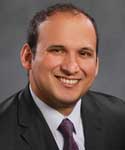ENAR 2022 Educational Program | ROUNDTABLES
Roundtables are conversations centered around a predetermined topic and led by a discussion leader. Due to the small group size, all attendees are able to participate equally, providing a more intimate discussion than a larger scientific session. All Roundtables take place Monday, March 28 from 12:15 pm to 1:30 pm.
Monday, March 28 | 12:15 pm – 1:30 pm
RT1 | Bridging the Gap Between Machine Learning and Conventional Statistics
Leader:
Noah Simon, Department of Biostatistics, University of Washington
Description:
Recent developments in statistical methodology and machine learning broaden the ways in which we think about predictive and inferential statistics. At this roundtable we will engage with how these changes mesh with more classical statistical models and approaches. I aim to have us examine/discuss scenarios where classical approaches are most appropriate, and contrast with scenarios where new approaches allow important flexibility and/or are critical to achieve our goals. In addition, I hope to have discussion around what training is most important for a modern-day data scientist.
Noah Simon is an associate professor in the Department of Biostatistics at the University of Washington. He works on problems at the intersection of public health, biology, statistics and computer science: He works on the development, implementation and application of machine learning algorithms with primary applications in the construction and evaluation of biomarker signatures. In addition he works on the design and analysis of clinical studies. He is also interested in pedagogy for both graduate and undergraduate statistics (and more generally).
Monday, March 28 | 12:15 pm – 1:30 pm
RT2 | Navigating the World of Grant Writing
Leader:
Debashis Ghosh, Department of Biostatistics and Informatics Colorado School of Public Health
Description:
With the ever-increasing reliance on grants for maintaining sustainability of research programs, this roundtable focuses on the issue of grant writing and grant operational processes. The following topics will be discussed: the difference in grant cultures and processes/operations between NIH, NSF and other groups; the role of grant writing vis-a-vis one's career trajectory; the type of grants that are available; general strategies for structuring grants; the role of calls for proposals. At least 1/2 of the time will be devoted to a question-and-answer/discussion section between the roundtable leader with the participants.
Debashis Ghosh is Professor and Chair of the Department of Biostatistics and Informatics at the Colorado School of Public Health. He was previously at Penn State University and the University of Michigan. His research interests are in machine learning methods and their application to a wide variety of problems in biostatistics and bioinformatics. He has over 230 publications in the scientific and statistical literature and has received methodological grants from the National Science Foundation and the National Institutes of Health. He has served on over 70 grant review panels. He has also mentored several faculty both in biostatistics as well as outside the field on an assortment.
Monday, March 28| 12:15 pm – 1:30 pm
RT3 | Survival Kit for the Scientific Publication Jungle
Leader:
Geert Molenberghs, Interuniversity Institute for Biostatistics and statistical Bioinformatics
Description:
Scholarly papers constitute a time-honored communication channel within the scientific community. Contemporarily, academic, governmental, and granting authorities place increasing importance on a researcher’s scientific output, often measured via the impact factor, the citation index, the Hirsch factor, etc.
Against this background, how should the junior and the senior scholar proceed to effectively communicate via scientific papers? How should one maximize chances of acceptance? What is the optimal journal? How should one ensure a published paper draws attention, is read, and gets cited? Are there specific issues for the non-native English speaker? Should one bother about collaborative papers or rather focus exclusively on methodological manuscripts?
These and other questions will be dealt upon in this roundtable, from the perspective of the editor, the associate editor, the referee, and the author. Scholarly and career-strategic considerations will be weighed.

Geert Molenberghs is Professor of Biostatistics at the Universiteit Hasselt and KU Leuven in Belgium. He received the B.S. degree in mathematics (1988) and a Ph.D. in biostatistics (1993) from the Universiteit Antwerpen. Dr Molenberghs published methodological work on surrogate markers in clinical trials, categorical data, longitudinal data analysis, and on the analysis of non-response in clinical and epidemiological studies. He served as Joint Editor for Applied Statistics, Co-editor for Biometrics, Co-editor for Biostatistics, Series Editor of Wiley Probability & Statistics, and Wiley StatsRef. He is currently Executive Editor of Biometrics. He acted and acts as Associate Editor for several journals and undertook numerous refereeing tasks (for journals, faculty member promotion, faculty member appointments, etc.). He was President of the International Biometric Society. He held visiting positions at the Harvard School of Public Health (Boston, MA). He is director of the Interuniversity Institute for Biostatistics and statistical Bioinformatics, I-BioStat in Belgium. He has (co-)taught nearly 200 short and longer courses on the topic in universities as well as industry, throughout the world. He has been serving on COVID-19 response scientific committees and advisory boards of the Belgian authorities.
Monday, March 28| 12:15 pm – 1:30 pm
RT4 | Learnings and Opportunities from a Single Sponsor Master Protocol
Leader:
Saptarshi Chatterjee, Eli Lilly and Company
Description:
In the realm of modern-day drug development, the Complex Innovative Trial Design (CID) Pilot Meeting Program conducted by FDA plays a significant role in facilitating and advancing the use of novel clinical trial designs which accelerates patient access to life-altering therapies. This roundtable will primarily focus on the case study of chronic pain master protocol (CPMP), sponsored by Eli Lilly and Company which was accepted to the CID Pilot Meeting Program. The challenges, learnings, and opportunities of conducting a single sponsor master protocol will be shared. The master protocol provides the innovative framework to efficiently evaluate the safety and efficacy of multiple assets in multiple pain types which facilitates borrowing of key statistical information between assets and pain types. The roundtable will also provide the opportunity to discuss pros and cons of various data borrowing strategies within the framework of master protocol.
Saptarshi Chatterjee is a Biopharmaceutical Statistician at Eli Lilly and Company. Saptarshi joined Lilly as Research Scientist in 2018 and since then assumed an integral role in statistical innovation in the area of Pain and Neurodegeneration. Saptarshi has extensive experience with development and design of master protocol, design and simulation of clinical trials and application of Bayesian methods and modeling in clinical trials. Prior to joining Lilly Saptarshi has got his PhD in Mathematical Sciences from Northern Illinois University. His research area of interest includes Bayesian methodology, causal inference, precision medicine, randomized clinical trial and observational study.
Monday, March 28 | 12:15 pm – 1:30 pm
RT5 | Establishing and Maintaining Successful Collaborations
Leader:
Andrea Troxel, NYU Grossman School of Medicine
Description:
We will discuss principles of collaboration by statisticians in biomedical research contexts. We will stress the importance of articulating expectations, of clear and frequent communication, and of setting, understanding, and implementing ground rules. We will discuss the goal of acting as a true collaborator, rather than simply a service provider, and review common pitfalls and strategies for success. We will also discuss collaboration from the standpoint of various roles, including faculty, master’s- and PhD-trained staff statisticians, and students. We will review case studies and provide time for Q&A and group discussion.

Andrea Troxel is a Professor of Population Health and Director of the Division of Biostatistics at NYU Grossman School of Medicine, leading a growing group of over 50 faculty, staff, and students conducting methodological and collaborative research in medicine and population health. In addition to her extensive experience in the design, conduct, and analysis of all phases of clinical studies, Andrea has published on innovative and adaptive clinical trial design and analysis, missing data, and sensitivity analyses. She is the author of more than 300 articles in the literature of statistical methodology, behavioral research, and other areas of medicine; in particular, she is an expert on randomized trials of behavioral interventions and on adaptive trial designs, with special focus on pragmatic trials and hybrid effectiveness/implementation studies. Andrea is an elected Fellow of the American Statistical Association and has served on Data Safety Monitoring Boards (DSMBs) for randomized trials in cancer, cardiac devices, smoking cessation, behavioral therapies, and COVID-19. Andrea currently serves as MPI for two Data Coordinating Centers, and is PI of the NINDS-funded COVID-19 Neuro Databank/Biobank. She is also MPI of the Clinical Science Core of the trans-NIH initiative to study post-acute sequelae of COVID-19 (PASC).
Monday, March 28 | 12:15 pm – 1:30 pm
RT6 | How to Leverage Mentoring and Networking for Career Success
Leader:
Renee Moore, Drexel University
Description:
Career success for a biostatistician may be measured in different ways- as the highest position at your place of employment, as financial success, as national/international recognition, as client satisfaction, as mentee success, and/or as personal satisfaction. In all scenarios, success depends on interaction with others, for biostatistics is a collaborative profession. And every interaction, including mentoring and being mentored, is an opportunity for networking. The most effective mentoring and networking is strategic, where goals of relationships are identified, timelines for achieving goals are set, and where mentoring circles are created. We will discuss mentor/mentee planning and strategic networking within the multiple venues of engagement (mentor/mentee, supportive colleague, collaborator, the body of biostatisticians) that we encounter during our journey towards career success.

Reneé H. Moore is Research Professor of Biostatistics, Director of the Biostatistics Scientific Collaboration Center, and Director of Diversity, Equity, and Inclusion in the Department of Epidemiology and Biostatistics at Drexel University. Dr. Moore defines three goals for her career- contributing to biomedical research and public health as a collaborative biostatistician; recruiting, mentoring, teaching, and retaining the next generation of statistical scientists; and increasing statistical literacy of scientific researchers, all while fostering diverse, equitable, and inclusive interactions. In 2017, Dr. Moore was recognized for significant achievement in these areas with induction as a Fellow of the American Statistical Association (ASA). Before Drexel, Dr. Moore’s journey has included faculty positions at the University of Pennsylvania, NC State University, and Emory University with her formal education starting at Bennett College for women in Greensboro, NC. Dr. Moore has held various leadership positions in ENAR, including for the Fostering Diversity in Biostatistics Workshop, and in ASA with the Committee on Minorities in Statistics (StatFest, JSM Diversity Mentoring Program). She is honored that her career and professional endeavors have afforded her the opportunity to be mentored, to mentor, and to network with our wonderful community of biostatisticians and collaborators.
Monday, March 28 | 12:15 pm – 1:30 pm
RT7 | A Seat at the Table: The Key Role of Biostatistics and Data Science in the COVID-19 Pandemic
Leader:
Jeff Morris, Perelman School of Medicine at the University of Pennsylvania
Description:
The rapid emergence of the novelty virus SARS-CoV-2 and resulting pandemic has necessitated accelerated knowledge discovery much faster than the usual scientific timelines. Much of this involves rapid evaluation and aggregating of information across data and studies, most pre-peer review, with numerous tricky quantitative issues including observational studies with many potential sources of bias, measurement error and informative missingness, aggregation of disparate data sources, as well as uncertainty quantification and level of evidence. As a result the skill set of biostatistical scientists has never been more important or central. In this roundtable, I will discuss experiences from my blog page covid-datascience.com and highlight the need for our profession to engage more with society and the media and have a “seat at the table” with policymakers, to ensure the tricky quantitative nuances are taken into account.

Dr. Morris is Professor and Director of Biostatistics at the Perelman School of Medicine at the University of Pennsylvania, having moved there in 2019 after 19 years at the University of Texas M.D. Anderson Cancer Center. He recently served as ENAR president, and is currently editor of Biology, Medicine and Genomics for The Annals of Applied Statistics.
His research interests focus on development of quantitative methods to extract knowledge from biomedical big data, including regression methods for complex functional data and integrative methods for multi-modal data, with applications in neuroimaging, mult-platform genomics and proteomics, and wearable devices. He has also done extensive applied work in cancer research, including construction of novel biomarker panels for cancer prognosis and subtype classification.
During the pandemic, he has been involved on a number of COVID-19 research projects, and has authored a blog https://covid-datascience.com in which he uses his skills and perspectives as a biostatistician to evaluate and synthesize accruing information in the pandemic, debunking misinformation and filtering out bias, to clearly communicate objective, empirically-based knowledge about various aspects of the pandemic to the general audience. He has been active in speaking with television, print, and online media about emerging scientific knowledge and evidence.
Monday, March 28| 12:15 pm – 1:30 pm
RT8 | Building Competence and Confidence for the Academic Job Search
Leader:
Rebecca Hubbard, University of Pennsylvania
Description:
One phrase sure to strike fear in the heart of any graduate student or post-doc is, “How’s the job search going?” Making the leap from trainee to professional can be daunting and particularly so for those interested in academic careers. The academic job search process is slow and complicated but, with appropriate preparation, need not feel overwhelming. The objective of this roundtable is to help demystify and reduce anxiety around the academic job search process by discussing the timeline and structure for academic hiring, sharing strategies for putting together a strong application, and sharing tips for preparing for the job interview that will help you put your best foot forward. This roundtable is intended for students, post-docs and early career professionals who are contemplating entering or re-entering the academic job market or who are currently in the midst of the job search process.
Rebecca Hubbard is a Professor of Biostatistics at the University of Pennsylvania. Prior to joining the University of Pennsylvania in 2014, she was an investigator at the Group Health Research Institute (subsequently renamed Kaiser Permanente Washington Health Research Institute). Her research focuses on the development and application of methods to improve analyses using real world data sources including electronic health records and medical claims data. Her methods have been applied across a broad range of research areas including health services research, cancer epidemiology, aging and dementia, and pharmacoepidemiology. Results of this work have been published in over 150 peer-reviewed papers in the statistical and medical literature. She is an ASA Fellow and has taught short courses at venues including ENAR, the Deming Conference on Applied Statistics, and for the ASA Council of Chapters for over 10 years.
Monday, March 28 | 12:15 pm – 1:30 pm
RT9 | Using Data Science to Improve Patient Care
Leader:
Susan White, The Ohio State University Wexner Medical Center
Description:
Healthcare is a business that is often data rich and insight poor. Healthcare analytics is a growing practice and integrating data science techniques into healthcare operations is a challenging, but high value effort. It requires a balance of clinical and data science. Complex models are difficult to communicate to a non-technical audience and a significant amount of transparency and attention to face validity of the models is required to gain momentum. Further, data science alone will not impact healthcare. The models and results need to be integrated into the clinical workflow. In this session, we will discuss challenges and successes in melding the two sciences to improve patient care.

Susan E. White, PhD, RHIA, CHDA is the Chief Analytics Officer at The Ohio State University Wexner Medical Center. She leads the Analytics Center of Excellence (ACE) and is charged with delivering analytic tools and content that support data driven decision making at the Medical Center. Dr. White previously held the role of Administrator of Analytics at The James where she led the design and implementation of alternative payment models for cancer as well as administration of the Cancer Program Analytics team. Prior to joining the Medical Center staff, she held a faculty position in the School for Health and Rehabilitation Sciences where she taught analytics and healthcare finance. The first 20 years of Dr. White’s career were spent in healthcare consulting where she developed data and benchmarking products to drive financial performance at hospitals and health systems. She is the author of four text books on the topics of statistics and finance in healthcare as well as many peer reviewed articles. Dr. White presents regularly at the state and national level on data analytics, data governance and quality measurement. She earned her PhD in statistics from The Ohio State University.









